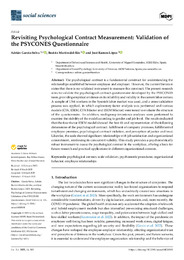Por favor, use este identificador para citar o enlazar este ítem:
https://hdl.handle.net/11000/38379Full metadata record
| DC Field | Value | Language |
|---|---|---|
| dc.contributor.author | García Selva, Adrián | - |
| dc.contributor.author | Martín del Río, Beatriz | - |
| dc.contributor.author | Ramos López, José | - |
| dc.contributor.other | Departamentos de la UMH::Ciencias del Comportamiento y salud | es_ES |
| dc.date.accessioned | 2025-11-21T11:10:20Z | - |
| dc.date.available | 2025-11-21T11:10:20Z | - |
| dc.date.created | 2025 | - |
| dc.identifier.citation | Social Sciences | es_ES |
| dc.identifier.issn | 2076-0760 | - |
| dc.identifier.uri | https://hdl.handle.net/11000/38379 | - |
| dc.description.abstract | The psychological contract is a fundamental construct for understanding the relationships established between employee and employer. However, the current literature states that there is no validated instrument to measure this construct. The present research aims to validate the psychological contract questionnaire developed by the PSYCONES team, providing empirical evidence on its reliability and validity in the current labor context. A sample of 1764 workers in the Spanish labor market was used, and a cross-validation process was applied, in which exploratory factor analysis was performed and various models (CFA, ESEM, CFA bifactor and ESEM bifactor) were tested to evaluate the structure of the questionnaire. In addition, multigroup invariance analyses were performed to examine the stability of the model according to gender and job level. The results indicated that the four-factor ESEM model showed the best fit and representation of the following dimensions of the psychological contract: fulfillment of company promises, fulfillment of employee promises, psychological contract violation, and perception of justice and trust. Likewise, the scale showed significant relationships with job satisfaction and organizational commitment, reinforcing its concurrent validity. This study provides a psychometrically robust instrument to assess the psychological contract in the workplace, offering a basis for future research and practical applications in different organizational contexts. | es_ES |
| dc.format | application/pdf | es_ES |
| dc.format.extent | 24 | es_ES |
| dc.language.iso | eng | es_ES |
| dc.publisher | MDPI | es_ES |
| dc.relation.ispartofseries | Vol. 14 | es_ES |
| dc.relation.ispartofseries | nº 3 | es_ES |
| dc.rights | info:eu-repo/semantics/openAccess | es_ES |
| dc.rights | Attribution-NonCommercial-NoDerivatives 4.0 Internacional | * |
| dc.rights.uri | http://creativecommons.org/licenses/by-nc-nd/4.0/ | * |
| dc.subject | psychological contract | es_ES |
| dc.subject | scale validation | es_ES |
| dc.subject | psychometric procedures | es_ES |
| dc.subject | organizational behavior | es_ES |
| dc.subject | employee relationships | es_ES |
| dc.subject.other | CDU::1 - Filosofía y psicología::159.9 - Psicología | es_ES |
| dc.title | Revisiting Psychological Contract Measurement: Validation of the PSYCONES Questionnaire | es_ES |
| dc.type | info:eu-repo/semantics/article | es_ES |
| dc.relation.publisherversion | https://doi.org/10.3390/socsci14030181 | es_ES |

Ver/Abrir:
Social Sciences, 14(3), 181.pdf
1,64 MB
Adobe PDF
Compartir:
 La licencia se describe como: Atribución-NonComercial-NoDerivada 4.0 Internacional.
La licencia se describe como: Atribución-NonComercial-NoDerivada 4.0 Internacional.
.png)